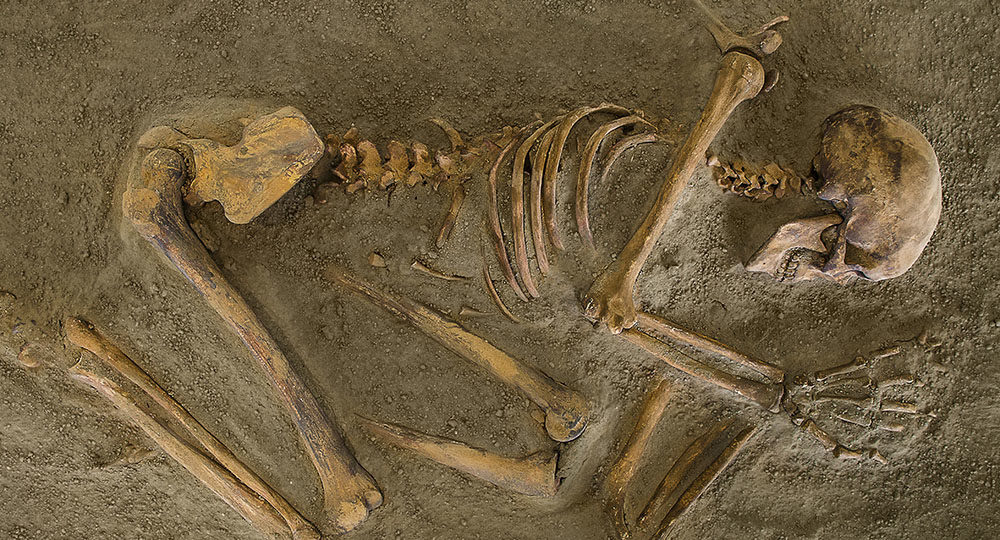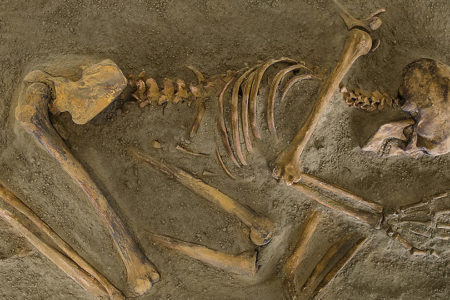A Trail of Carcasses
How could a journey to the promised land turn into such a disaster? The book of Numbers details the Israelites’ wanderings in the desert–and what went wrong.
Camped at Sinai for 12 months, the fledgling nation of Israel received God’s Law, constructed His Tabernacle, and established the Levitical priesthood. It had great dreams and high expectations of entering a land that flowed “with milk and honey” as it set out from Sinai to the triumphant sound of silver trumpets.
THE EXODUS REVEALED
Discover more about the Israelites’ wandering through the wilderness in The Exodus Revealed DVD.
Yet the Israelites of that generation experienced an average of 90 funerals a day (270 a month)—a far cry from what they had anticipated. The book of Numbers records their journey and the failure and demise of the Exodus generation as it wandered in the wilderness en route to the Promised Land.
An 11-day journey turned into 40 years of wilderness camping and high death tolls. The inspiring story of God’s grace and power, displayed when He delivered the Jewish people from Egypt, became a story of disappointment and discouragement. What went wrong? Bible scholar Paul House explained,
All these hopeful possibilities are obliterated due to the most fundamental sin of all, which is the human refusal to believe God’s word. In a crucial moment, faithlessness costs the Exodus generation their opportunity to possess the physical embodiment of Yahweh’s covenant with Abraham and with the nation as a whole. They lose their opportunity to live in Canaan, the promised land. Instead they conclude their earthly journey by journeying among hostile peoples in barren desert lands. God’s promise of land remains intact, though, so the next generation will conquer Canaan. But this triumph is deferred for nearly forty years due to the theological amnesia that results in national disaster.1
Overview
Numbers is the fourth book in the Law of Moses, or Pentateuch (Greek for “five books”), and it describes the failure and demise of the Exodus generation. Jesus attributed the entire Law to Moses’ authorship (Lk. 24:44). Therefore, Numbers is a firsthand, eyewitness, Spirit-inspired record of the Israelites’ journey from Sinai to the border of the land God promised them, written by the very man who led the journey. Moses was highly educated and the greatest Old Testament prophet.
The book received its name because chapter 1 records the numbering of the able-bodied men of each tribe of the first generation of Israelites out of Egypt, and chapter 26 provides the numbering of those in the second generation.
Chapters 1—10 detail God’s mobilization of the nation for its journey. There were 603,550 able-bodied men, 20 years of age and older, from the 12 tribes of Israel (the Levites were not included in the number; 1:20–47). An equal number of women probably were present, which would bring the number of adults to approximately 1.25 million. An equal number of children (at least) would bring the total to 2.5 million.
The book details the tribes’ encampment around the Tabernacle, the duties of all of the Levites, and the Lord’s final regulations in preparation for the Israelites’ departure. Tribal leaders give dedication offerings to the Lord, and everyone celebrates the Passover. The priests sound the trumpets, and the nation breaks camp for the first time to follow the Ark of the Covenant to the Promised Land (10:13). Moses proclaims, “Rise up, O LORD! Let Your enemies be scattered, and let those who hate You flee before You” (v. 35).
Chapters 11—25 describe the Israelites’ many complaints toward God and the consequences they suffered because of their lack of faith. They complain about the food, the lack of water, Moses’ wife, and the dangers of conquering the land. Ten of the 12 spies Moses sent to scout out Canaan complain that conquering the land would be too dangerous, and they lead the people to rebel against entering it (13:25—14:4).
God had provided ample evidence of His wise providence, omnipotent protection, and gracious provision. Yet the Israelites gripe. Their refusal to trust Him to bring them into the land is the last straw. Though He forgives them in response to Moses’ intercession, God declares He is finished with them in this most pivotal passage of Numbers:
How long shall I bear with this evil congregation who complain against Me? I have heard the complaints which the children of Israel make against Me. Say to them, “As I live,” says the LORD, “just as you have spoken in My hearing, so I will do to you: The carcasses of you who have complained against Me shall fall in this wilderness, all of you who were numbered….Except for Caleb the son of Jephunneh and Joshua the son of Nun, you shall by no means enter the land which I swore I would make you dwell in. But your little ones, whom you said would be victims, I will bring in, and they shall know the land which you have despised. But as for you, your carcasses shall fall in this wilderness. And your sons shall be shepherds in the wilderness forty years, and bear the brunt of your infidelity, until your carcasses are consumed in the wilderness. According to the number of the days in which you spied out the land, forty days, for each day you shall bear your guilt one year, namely forty years, and you shall know My rejection” (14:27–34).
The rest of this section records the sad story of 40 years of wandering and dying in the wilderness (including the deaths of Miriam and Aaron in the 40th year), all of which could have been avoided had the Israelites exercised faith.
Chapters 26—36 cover God’s instructions to the next generation concerning entering the land. The section begins with a census, which results in an almost identical number of able-bodied men as in the previous generation. God again uses Moses to prepare the people. Joshua becomes Moses’ successor, since Moses is not permitted to enter Canaan (20:12; Dt. 3:23–28).
God also provides instructions for occupying the land and for the cities of refuge. He permits two and one-half tribes to settle in what today is Jordan. The Israelites conquer Midian; and the book ends with Israel camped on the plains of Moab, opposite Jericho, poised to enter Canaan.
Lessons from Numbers
The main message is that redeemed people must appropriate God’s plan for their lives by walking by faith. What happened to the first generation of Israelites that left Egypt should remind us to trust Him always and be thankful. We must let God develop our faith as He sees fit. More than 1,400 years later, the writer to the Hebrews wrote,
By faith Abel offered to God a more excellent sacrifice than Cain, through which he obtained witness that he was righteous, God testifying of his gifts; and through it he being dead still speaks. By faith Enoch was taken away so that he did not see death, “and was not found, because God had taken him”; for before he was taken he had this testimony, that he pleased God. But without faith it is impossible to please Him, for he who comes to God must believe that He is, and that He is a rewarder of those who diligently seek Him (11:4–6).
Repeated disobedience (lack of faith) increases the seriousness of the consequences and may even lead to our being removed from the forefront of God’s purposes for our lives. Repeated refusal to trust God can lead to spiritual immaturity. House wrote, “Not even the chosen people may neglect Yahweh’s instruction and emerge unscathed. Numbers 20:1–13 proves that not even Moses himself can disobey God without paying a spiritual, physical and emotional price.”2
It is possible for a believer to be put on a shelf. The writer of Hebrews addressed Jewish believers who were experiencing extremely painful trials, warning them about such danger (Heb. 3:7—4:13; 6:6–12; 10:32–39).
Trials should be expected but embraced with joy (Jas. 1:2–4). It is impossible to please God without faith, and it is impossible to have faith without trials. God uses trials to mature us spiritually. By His design, they are always hard but never impossible (1 Cor. 10:13).
Grumbling highly offends God because He has revealed to His children that He loves them (always seeks their highest good) and that nothing can ever separate them from His love (Rom. 8:28–39): “What then shall we say to these things? If God is for us, who can be against us? He who did not spare His own Son, but delivered Him up for us all, how shall He not with Him also freely give us all things?” (vv. 31–32).
In Philippians 2:13–15, the apostle Paul wrote,
It is God who works in you both to will and to do for His good pleasure. Do all things without complaining and disputing, that you may become blameless and harmless, children of God without fault in the midst of a crooked and perverse generation, among whom you shine as lights in the world.
God is faithful to His covenant promises despite His children’s rebellion. Even in the midst of pronouncing judgment on the rebellious Exodus generation, He promised to take their children into the Promised Land. The trail of carcasses in the wilderness was the consequence of no faith. Yet God is faithful even when we are not. He will accomplish His purposes and fulfill His promises regardless of His people’s behavior. At issue is whether we will experience His blessings and enjoy His presence by trusting in Him.
Endnotes
- Paul R. House, Old Testament Theology (Downers Grove, IL: InterVarsity Press, 1998), 153.
- Ibid., 160.








